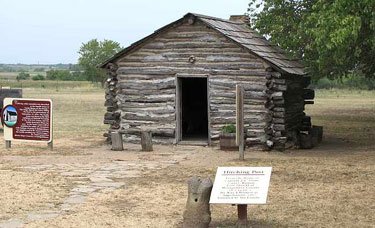
Laura Ingalls Wilder’s Little House on the Prairie reconstructed at the original location, 12 miles southwest of Independence, Kansas.
Megan McArdle reflects on the amazing way in which contemporary Americans enjoy an unprecedented kind of material abundance and have forgotten completely that there was ever a time when people got by with so much less.
Last week, in her State of the Union response, Joni Ernst mentioned going to school with bread bags on her feet to protect her shoes. These sorts of remembrances of poor but honest childhoods used to be a staple among politicians — that’s why you’ve heard so much about Abe Lincoln’s beginnings in a log cabin. But the bread bags triggered a lot of hilarity on Twitter, which in turn triggered this powerful meditation from Peggy Noonan on how rich we have become. So rich that we have forgotten things that are well within living memory:
I liked what Ernst said because it was real. And it reminded me of the old days.
There are a lot of Americans, and most of them seem to be on social media, who do not know some essentials about their country, but this is the way it was in America once, only 40 and 50 years ago:
America had less then. Americans had less. …
…
I am a few years younger than Noonan, but I grew up in a very different world — one where a number of my grammar school classmates were living in public housing or on food stamps, but everyone had more than one pair of shoes. In rural areas, like the one where Joni Ernst grew up, this lingered longer. But all along, Americans got richer and things got cheaper — especially when global markets opened up. Payless will sell you a pair of child’s shoes for $15, which is two hours of work even at minimum wage.
Perhaps that sounds like a lot to you — two whole hours! But I’ve been researching historical American living standards for a project I’m working on, and if you’re familiar with what Americans used to spend on things, this sounds like a very good deal.
Consider the “Little House on the Prairie” books, which I’d bet almost every woman in my readership, and many of the men, recalls from their childhoods. I loved those books when I was a kid, which seemed to describe an enchanted world — horses! sleighs! a fire merrily crackling in the fireplace, and children frolicking in the snow all winter, then running barefoot across the prairies! Then I reread them as an adult, as a prelude to my research, and what really strikes you is how incredibly poor these people were. The Ingalls family were in many ways bourgeoisie: educated by the standards of the day, active in community leadership, landowners. And they had nothing.
There’s a scene in one of the books where Laura is excited to get her own tin cup for Christmas, because she previously had to share with her sister. Think about that. No, go into your kitchen and look at your dishes. Then imagine if you had three kids, four plates and three cups, because buying another cup was simply beyond your household budget — because a single cup for your kid to drink out of represented not a few hours of work, but a substantial fraction of your annual earnings, the kind of money you really had to think hard before spending.
Read the whole thing.





